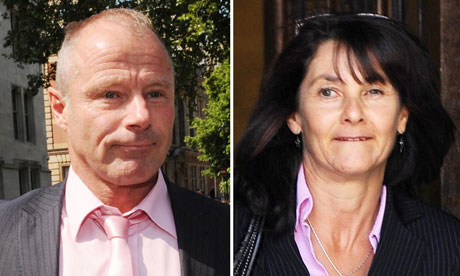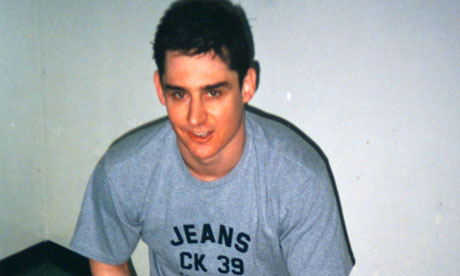Supreme court rules on property rights
for unmarried couples
Owen Bowcott, legal affairs correspondent

Leonard Kernott and Patricia Jones outside the supreme court in London. The fate of the former couple's bungalow has been followed by family lawyers. Photograph: Stefan Rousseau/PA
A supreme court judgment awarding a female hairdresser the overwhelming share of an Essex bungalow has redefined the property rights of unmarried couples and triggered calls for legal reform.
The unexpected ruling in the long-running case of Kernott v Jones overturns previous, strict interpretations of property titles and exposes the inadequacies of what one legal expert described as a "fairly incomprehensible" area of the law.
There are more than two million unmarried couples living together in England and Wales; almost 50% of children are now born outside marriage.
The unanimous decision by five supreme court justices makes it clear that even though the home was registered in the names of both the man and the woman, judges are permitted to substitute a fairer division of possessions.
Earlier this autumn the government announced it would not take up the Law Commission's recommendations on reforming the rules governing property rights of cohabitees in this parliament. Specialists in family law, however, warned more split-ups will now be contested and called for urgent parliamentary reform.
Leonard Kernott and Patricia Jones separated in 1993 after living together in their property in Thundersley, Essex, for eight years. The supreme court was asked whether the assets should be shared 50/50 or predominantly allocated to the woman, who has paid all of the mortgage for the past 13 years.
Kernott, 51, an ice cream salesman, moved out after the breakup, leaving Jones, 56, a hairdresser, to pay the mortgage, maintain the house – valued at £245,000 in 2008 – and raise the couple's two children, the court was told.
The court heard Kernott, now of Benfleet, Essex, waited until his children were grown before making a claim on his old home in 2006. In 2008, a county court judge sitting in Southend ruled that Jones should get 90% of the value of the house and her former partner 10%. That decision was upheld by the high court in London in 2009.
But last year the court of appeal overturned the lower courts' rulings, deciding that Kernott was entitled to half the value of the house because the couple owned equal shares when they separated and neither had since done anything to change the situation.
In restoring the county court order for sharing the assets, Lord Walker and Lady Hale said it was a "… logical inference that [the couple] intended [Kernott's] interest in Badger Hall Avenue should crystallise" in 1995, when they took the house off the market and cashed in an insurance policy, so that Kernott was able to buy a house in his own name.
The presumption of joint beneficial ownership could be rebutted by evidence that it was not, or ceased to be, the common intention of the parties to hold the property jointly, the justices said.
Another supreme court justice, Lord Wilson, added: "In the light of the continued failure of parliament to confer upon the courts limited redistributive powers in relation to the property of each party upon the breakdown of a non-marital relationship, I warmly applaud [this] development of the law of equity."
Lord Kerr said that the split of 90% and 10% originally imposed by a county court judge was "a fair one as between the parties".
Speaking after the ruling, Kernott said he accepted the judgment and hoped to move on with his life. "I never wanted 50%," he said. "I thought 25% would be a fair reflection of what I had put into the property.
"When I lived there, I paid for everything and I completely refurbished the place. I have been painted as this ogre who walked out on his family. I love my family. I didn't want to leave but it was made unbearable for me to stay. It's a sad day for men who are left in a similar position to me and it feels like the law will always side with the woman."
Jones's solicitor, Ivan Sampson, said: "She is absolutely delighted – and I'm delighted for her. It seemed to be that the case was decided on the facts."
Many solicitors, who had been expecting the court of appeal ruling to be ratified, welcomed the judgment as a fairer distribution of property. Victoria Francis, a solicitor at the law firm Speechly Bircham, said: "The supreme court's decision may go some way to addressing the injustices inherent in the current law affecting cohabitees but it does so at the cost of certainty and will surely lead to more litigation, as co-owners attempt to unscramble what is really a fairly incomprehensible area of the law unless you are a specialist in it. The law in this area is not fit for purpose."
"Couples should not assume that the legal pieces of paper that show co-ownership of a property are the end of the story. If one of them goes on to make a different arrangement, for example moving out or not paying the mortgage, then the court can and will adjust the original shares," said Alison Hawes, at the solicitors Irwin Mitchell.
A barrister and specialist family lawyer at Mills & Reeve, Joanna Grandfield, said: "The supreme court's decision approves the increasing tendency of the courts to avoid the harsh results of a strict interpretation of property law through the use of 'inferred intentions' as a means of getting round legally correct, but morally unfair results. Legislation needs to be introduced to reflect the society which it is supposed to serve."
Head of family law at Mishcon de Reya, Sandra Davis, said: "The continued failure of Parliament to introduce legislation which protects the property interests of the two million cohabiting couples in this country is a disgrace. It beggars belief that because of decades of parliamentary disinterest, Jones and Kernott have had to litigate, at significant expense, a dispute over the ownership of their family home in four separate courts."
The situation is different in Scotland where five years ago the devolved administration legislated to give cohabitees financial rights and obligations. Emma Collins, of law firm Weightmans said: "Despite many other countries, including Scotland, committing to cohabitation laws, the UK government remains reluctant and has confirmed that no cohabitation law reforms will be implemented in this parliamentary term. It is hoped that this ruling, alongside the Law Commission's detailed recommendations for a new statute, encourage the government to take the matter more seriously."
Read the full judgment here
Judgment giving 90% of house to woman who paid mortgage for 13 years has implications for millions of unmarried couples



